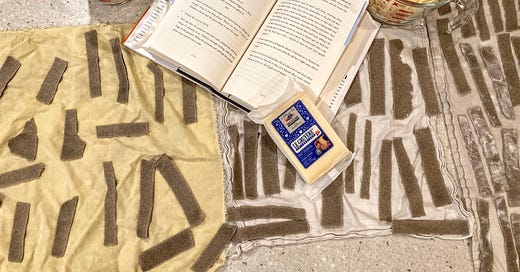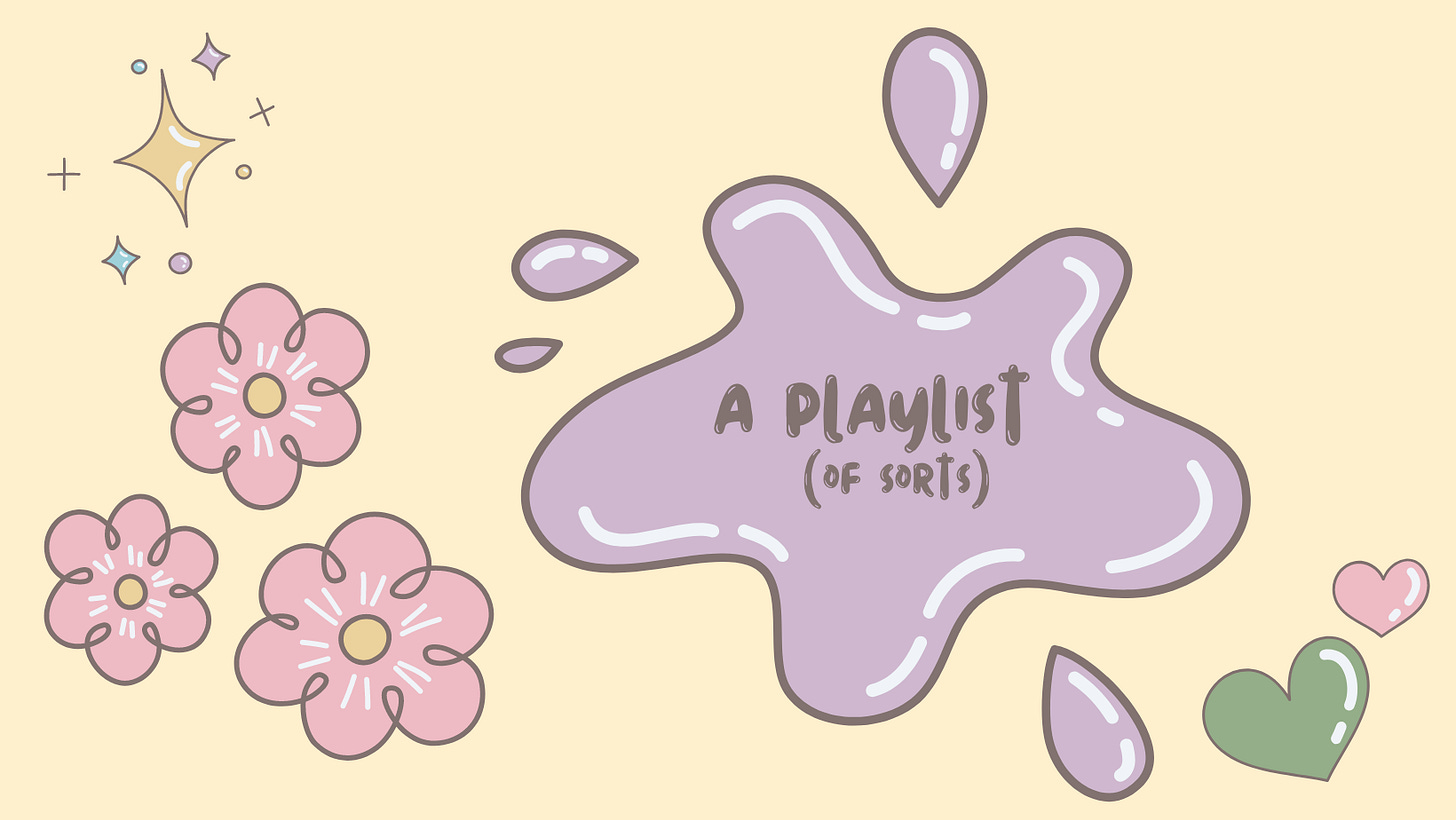“I wish I had as much confidence with my pen as I do with a pile of ingredients,” I texted my writing friends, while standing at the kitchen counter, admiring the buckwheat pasta I had just made.
I saw a recipe in Taste that caught my eye. With a name like Pizzoccheri, I first imagined it to be something like pizza. As I read the recipe, however, I discovered it wasn’t pizza at all, but a pasta dish. Made with potatoes, cabbage, lots of cheese, and pasta, it seemed so simple—a peasant's dish really—but Stanley Tucci made it sound irresistible. Knowing I had half a head of cabbage in the fridge, I thought I’d give it a try.
Annoyed that Tucci assumed I could find this very specific type of pasta in the store, I searched Google for a recipe. Homemade pasta has become something of a staple in our house in the last two years, so I was curious about how difficult this one was to make. When I discovered pizzoccheri is made with nothing but buckwheat flour, 00 flour and water, I couldn’t resist the pull I felt to make my own. I hadn’t made pasta with anything other than all-purpose flour and semolina, but this felt like a good challenge.
Glancing at the recipe once again, I made a grocery list: buckwheat flour, 00 flour, and cheese. I grabbed my purse, told my family I was leaving, and headed to Whole Foods. I didn’t think about whether or not I could make the recipe perfectly. I simply took the next step, fairly confident that I would succeed.
Earlier that day, I received feedback on a piece I’ve been working on for months now. After reading the critiques, I wasn’t sure how to do what needed to be done. I felt like the entire thing needed to be scrapped. I have no recipe to follow. No list of ingredients to purchase. Just a bunch of ideas floating through the atmosphere.
I know the feedback will make the piece better in the long run, but in that moment I felt like a mediocre writer. Although I had writing time that afternoon, I had no desire to sit down with a notebook and a pen. So I went to the store for ingredients I didn’t have and made a new pasta I had never heard of before.
Pizzoccherri was something I could create—and control—without fear of what a critic might think. If I tasted it and liked it, it would be a success. If it failed, I’d throw it out—and likely wouldn’t try the same recipe again. I’d find a different one the next time. I’d find a new way to try again.
After comparing a couple of recipes to decide on the ratio, I mixed the two flours together by hand, and added water until it felt like dough. Had you told me three years ago to “add water until it feels right,” I would have given you a look that could kill. In fact, I remember the first time I made pasta with my neighbor, four years ago. “How do you know how much water to add?” I asked, watching her mix beet puree with flour and eggs.
“Until you get the consistency that you want,” she confidently replied.
How do I know that? I thought to myself while nodding my head silently. I didn’t know then that I would have lots of practice making pasta during the pandemic. Through practice, I’d experience dough that was too sticky and dough that was too firm. And eventually, I would know the consistency she was talking about.
Once the pasta was done, I set it out to dry while I chopped cabbage, sliced potatoes, and shredded cheese. I whipped up that old Italian dish like I had done it a thousand times. I really had no idea what I was doing, but I followed the recipe the best I could, and used my judgment to fill in the holes. Everyone enjoyed it. No one complained. I created. We partaked. Life went on. I felt good about what I created. I felt proud. Until the next day, when no one would eat the leftovers for lunch. It seems pizzoccheri is only good when fresh.
My confidence in the kitchen has come with merely a matter of time. There was a time when I wouldn’t dare mess with a recipe. I followed them exactly, for fear if I didn’t, the whole thing would be a disaster. But as time went on, I’d play around with things here and there. Cooking became less about following directions and more about having fun. For a while, it felt like cooking was the only thing I had control over, so it became a way for my Type A Control freak personality to have a place to shine. But the more I cooked, the more I knew about cooking, and the more I was willing to try. It became less about control and more about play.
“I think you’re onto something,” my friend texted back later that night. She encouraged me to wonder what might happen if I allow myself to play more in writing, the way I am willing to play in the kitchen. Instead of taking critiques to heart, maybe feedback can become an ingredient to work with. Like pasta, over time, I’ll learn the right consistency of words—how to tell my story well and have fun at the same time.
Like Ralph Waldo Emerson once said, “It is a happy talent to know how to play.” In this month’s newsletter, you’ll find lots of ideas for ways to play. I’d love for you reply to this email and share your stories of play. Have you tried something I’ve shared? Have a trick to share? How are you finding ways to play?
It’s iced coffee season! Once or twice a week, I make this magical coffee and keep it in the fridge. I like to make it out of decaf, so I can drink it later in the day. It’s delicious as is, but it’s also splendid with a little frothed milk. We have this frother and it is my favorite thing in the kitchen.
We’re nearing the end of our Winter Farm Share and our freezer stock is getting low. We’re eating a lot of enchiladas and nachos (can you ever go wrong with Mexican food?) I love both of these recipes because you can alter them based on what you have to work with.
I’m making a lot of polenta these days (aka grits where I come from). This recipe is super easy if you have an Instant Pot, and it’s so versatile. We eat it under bolognese, under greens, with bacon and eggs, or simply plain in a bowl.
Speaking of bolognese, I currently have a pot of Red Pepper Bolognese simmering on the stove, from the new Half Baked Harvest cookbook. I found loads of roasted red peppers in my freezer this weekend, and it looked like a delicious way to use some of them up. Don’t have the book? This Simple Roasted Red Pepper Pasta looks like a good substitute.
I made this Pasta Primavera last week, subbing in frozen snap peas and leaving out the asparagus (ours wasn’t quite ready yet). It was light and airy and simply delightful. My kids begged for more.
While we’re talking about playing in the kitchen, I have to tell you about Occasionally Eggs, by Alexandra Daum. This is THE cookbook I’ve been searching for since I first joined our farm share six years ago. Her recipes make seasonal eating easy and accessible and I am her new biggest fan. She has a great website too.
I picked up Sunrise by the Sea by Jenny Colgan on a whim at the library a few weeks ago and it was exactly the book I needed to get me out of a reading rut. I especially love the role cooking plays in the main character’s journey towards healing.
My book club read Devil in the White City this month. It had been on my TBR pile for several years now, and while I can’t say I loved it, I learned a few fun nuggets of history. I know a lot of people love this book, but I didn’t love the structure. Have you read it? What did you think?
Perhaps the most surprising enjoyable read of the month for me was Emily St John Mandel’s new book, Sea of Tranquility. I thought it was her best written book yet, and really loved the way she explored time travel.
Since we’re talking about play this month, I put together a fun playlist of our favorite dance tunes (best listened to on shuffle.) We like to crank it in our kitchen speaker and dance all around the house. It also is an excellent playlist to listen to when you need your family to do chores without complaint.
As an extra bonus this month, go watch this video on making polenta. I love the way she plays in the store, and then heads to the kitchen for a little fun (and delicious food.)
“A few easy ingredients! A casual flip! Serves one! Ephron delightfully blends creativity and sophistication.” ~12 Unforgettable Descriptions of Food in Literature
“The question of what makes a world real is one that I kept going back to in writing this book.”~Interview with Emily St. John Mandel
A local freshman in high school has become the youngest person ever to build a crossword puzzle for the New York Times. ~Boston Globe
“I’ve come to value books not just for the experience of reading them, but for the passages I collect from them.” ~Starting a Commonplace Book
“When I was a girl, I stumbled on my mother’s secret life.” ~The Secret Lives of Writers and Mothers
“I made the mistake—at least it seemed a mistake at first—of inviting the children to prompt me with ideas of their own…” ~On Letting Children Come Up With Their Own Bedtime Stories
In honor of National Poetry Month, I wrote about discovering the joy of poetry, shared five books of poetry for beginners, and gave some tips on how to read (and enjoy) poetry.
I’m back on the ‘gram with some thoughts on the quiet hope of Easter, how new life happens over time, a breaking news reel, and some beautiful things I’m noticing around me. And speaking of the ‘gram, David created an account for our adorable teddy bear puppy.
I joined the Literary Mama team as their new Blog Editor!
Two of my poems found their way into the world in The Order of Us: Expectations, Restoration, and the Beauty of Chaos, available now on Amazon. All proceeds from the sale of this book are going to Dolly Parton’s Imagination Library.
And last week I took some time to play and had a little fun with the Exhale Creativity Blog Hop theme “Breaking News.” My headline: Homeschool Mom Encounters Season of Doubt; Has No Clear Exit Strategy.
May you give yourself grace to let go of the neverending list of to-dos; may you forget about what people think and follow where your heart leads; may your days be filled with laughter and creativity; and may you rest in the healing power of play.
Until next month,
Find me on Instagram | Twitter | The Blog | The Website











